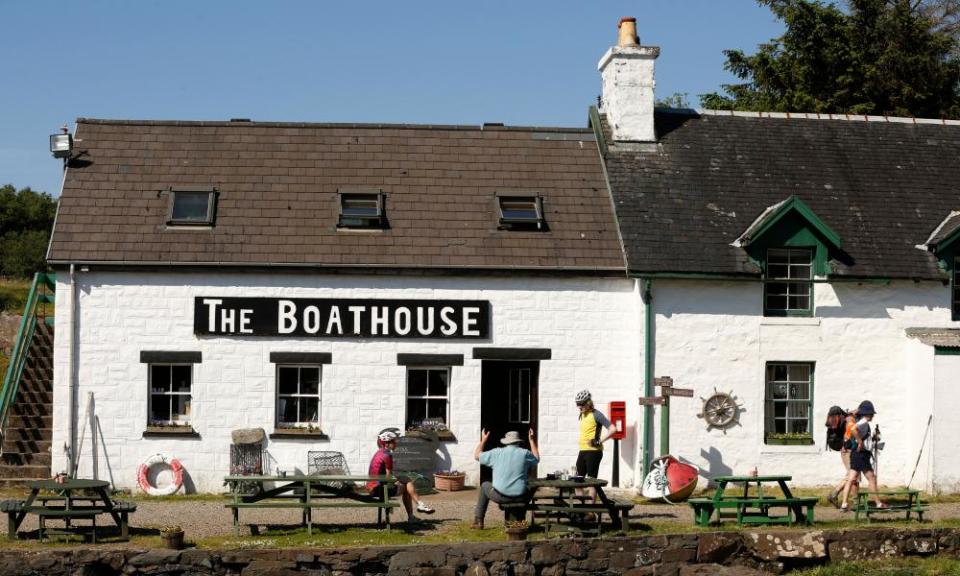Plan to repopulate Scottish island of Ulva begins with ... a herd of cattle

At Scotland’s western edge, made jagged by ancient elements, a new model for living is taking shape. Ulva, a small island in the Inner Hebrides, off the west coast of Mull, is beginning to reverse decades of population decline.
The island’s current population is six but before another generation has passed it’s expected to grow tenfold. Once, it had a population of more than 800 but many were driven out, their homes set alight by brutal landowners who replaced them with more economically sound sheep.
The process of reversing decline began with a community buy-out of the island in 2018 from its then owner. At its heart was a strategy to bring about the “social and economic development” of Ulva for the benefit of the larger community and for future generations.
Wendy Reid, Ulva’s development manager, says the long-term goal goes well beyond bringing people back to the island. “We need to do this in a way that’s mindful of the other creatures that live in this place. There has to be a communion between humans, animals and nature.”
These creatures include hen harriers, sea eagles and golden eagles, and multitudes of insect species. Next week, a fold of 30 Highland cattle will begin to graze. It will be the first step in natural land management. Soon, work will start on refurbishing and repurposing existing cottages and redundant agricultural dwellings. Later, a few plots of land will be sold and families invited to build homes on them.
Reid says: “We had more than 500 notes of interest, from 26 different countries.” But, she adds, interest from further afield needs to be balanced against local need. “Our vision is to attract people who can make something of this place and bring the skills and talents required to build the community, but also to be stewards of the land and protectors of other species. We’ve had ecological surveys made to help us identify the habitats of these creatures and to ensure that future land management complements them. We want to co-exist, not conquer.”
If collectivism could ever happily cohabit with the free market then it might look like this, where families are invited to build homes and create businesses. They would make enough money to subsist and live comfortably but pay something back to the community that provided the opportunity. Ulva had 7,000 visitors last year and the repurposing of the former laird’s “Big House”, the shooting lodge and the old church manse will bring more. The process will provide new work for old skills on neighbouring Mull and help to sustain the local economy.
Recent surveys indicate that Scotland’s island population is declining at an alarming rate. Economic stress and feelings of social dislocation drive young people to the mainland, rarely to return. Of Scotland’s 790 islands, only 94 have a resident population. Many on these islands and in the Scottish government are watching developments on Ulva with an eye to the future. In time, they may provide some answers to shortages in affordable housing.

No one will get rich on Ulva but no one will go without, either. “We want to attract people from all backgrounds,” says Reid, but also keeping one goal in common: to contribute to the wellbeing of the community with their skills and talents. “I know this all sounds utopian but Utopia doesn’t exist. Right now, it’s relatively easy to achieve consensus because there are so few of us. This may become less so as numbers increase.
“Human nature has a habit of breenging in and wrecking good intentions. Well, so be it. This is real life and it will be up to the people who come here to sustain these ideals. You can’t force a system on people; you can only provide an opportunity to build something better.”
The Boathouse restaurant is rapidly gaining a reputation for its fresh seafood. Rebecca Munro, resident and co-owner, said: “I love living on Ulva. Our children have freedoms denied to most others. They play outside when the weather is dry, and in the summer they swim in the sea after school. Ulva primary school, just across the water on Mull, provides an excellent education and I am thankful that their world is not dominated by technology. They would rather be outside playing in an imaginary world or walking in the woods. Living here offers them a connection [to] and awareness of the environment around them. Once there are more children, it really will be the perfect place to bring up a family.”

 Yahoo News
Yahoo News 
